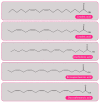Omega Fatty Acids and Inflammatory Bowel Diseases: An Overview
- PMID: 31574900
- PMCID: PMC6801729
- DOI: 10.3390/ijms20194851
Omega Fatty Acids and Inflammatory Bowel Diseases: An Overview
Abstract
Inflammatory bowel diseases (IBD) are chronic, inflammatory processes that affect the gastrointestinal tract and are mainly represented by ulcerative colitis (UC) and Crohn's disease (CD). Omega 3 (ω3) fatty acids (eicosapentanoic acid and docosahexaenoic acid) show an indispensable role in the inflammatory processes and, for these reasons, we aimed to review the effects of these acids on UC and CD. Databases such as PUMED and EMBASE were searched, and the final selection included fifteen studies that fulfilled the inclusion criteria. The results showed that ω3 fatty acids reduce intestinal inflammation, induce and maintain clinical remission in UC patients, and are related with the reduction of proinflammatory cytokines, decrease disease activity and increase the quality of life of CD patients. Furthermore, the consumption of these fatty acids may be related to a reduced risk of developing IBD. Many studies have shown the beneficial effects of ω3 as adjunctive in the treatment or prevention of UC or CD. Nevertheless, most were performed with a small number of patients and there are many variations in the mode of consumption, the type of food or the type of formulation used. All these factors substantially interfere with the results and do not allow reliable comparisons.
Keywords: crohn’s disease; docosahexaenoic acid; eicosapentaenoic acid; omega 3; ulcerative colitis.
Conflict of interest statement
Authors declare no conflict of interests.
Figures




Similar articles
-
Unraveling the causal link: fatty acids and inflammatory bowel disease.Front Immunol. 2024 Jul 25;15:1405790. doi: 10.3389/fimmu.2024.1405790. eCollection 2024. Front Immunol. 2024. PMID: 39119343 Free PMC article.
-
Omega-3 fatty acids in inflammation and autoimmune diseases.J Am Coll Nutr. 2002 Dec;21(6):495-505. doi: 10.1080/07315724.2002.10719248. J Am Coll Nutr. 2002. PMID: 12480795 Review.
-
Comment On: Maintenance of Remission in Inflammatory Bowel Disease Using Omega-3 Fatty Acids (Fish Oil): A Systematic Review and Meta-Analyses.Nutr Clin Pract. 2011 Apr;26(2):202-203. doi: 10.1177/0884533611400087. Nutr Clin Pract. 2011. PMID: 28094597
-
Long-term effects of increasing omega-3, omega-6 and total polyunsaturated fats on inflammatory bowel disease and markers of inflammation: a systematic review and meta-analysis of randomized controlled trials.Eur J Nutr. 2021 Aug;60(5):2293-2316. doi: 10.1007/s00394-020-02413-y. Epub 2020 Oct 21. Eur J Nutr. 2021. PMID: 33084958
-
Cannabis and Canabidinoids on the Inflammatory Bowel Diseases: Going Beyond Misuse.Int J Mol Sci. 2020 Apr 22;21(8):2940. doi: 10.3390/ijms21082940. Int J Mol Sci. 2020. PMID: 32331305 Free PMC article. Review.
Cited by
-
Fish Sidestream-Derived Protein Hydrolysates Suppress DSS-Induced Colitis by Modulating Intestinal Inflammation in Mice.Mar Drugs. 2021 May 28;19(6):312. doi: 10.3390/md19060312. Mar Drugs. 2021. PMID: 34071180 Free PMC article.
-
Lactic Acid Bacteria-Gut-Microbiota-Mediated Intervention towards Inflammatory Bowel Disease.Microorganisms. 2024 Sep 9;12(9):1864. doi: 10.3390/microorganisms12091864. Microorganisms. 2024. PMID: 39338538 Free PMC article. Review.
-
The assessment of plasma fatty acid profiles in newly diagnosed treatment-naive paediatric Crohn's disease.Physiol Res. 2021 Nov 29;70(5):799-808. doi: 10.33549/physiolres.934665. Epub 2021 Sep 10. Physiol Res. 2021. PMID: 34505533 Free PMC article.
-
Colonic Tuft Cells: The Less-Recognized Therapeutic Targets in Inflammatory Bowel Disease and Colorectal Cancer.Int J Mol Sci. 2024 Jun 5;25(11):6209. doi: 10.3390/ijms25116209. Int J Mol Sci. 2024. PMID: 38892399 Free PMC article. Review.
-
Collagen Peptides and Saccharomyces boulardiiCNCM I-745 Attenuate Acetic Acid-Induced Colitis in Rats by Modulating Inflammation and Barrier Permeability.Food Sci Nutr. 2025 Apr 18;13(4):e70189. doi: 10.1002/fsn3.70189. eCollection 2025 Apr. Food Sci Nutr. 2025. PMID: 40255550 Free PMC article.
References
-
- Diab J., Al-Mahdi R., Gouveia-Figueira S., Hansen T., Jensen E., Goll R., Moritz T., Florholmen J., Forsdahl G. A quantitative analysis of colonic mucosal oxylipins and endocannabinoids in treatment-naïve and deep remission ulcerative colitis patients and the potential link with cytokine gene expression. Inflamm. Bowel. Dis. 2019;25:490–497. doi: 10.1093/ibd/izy349. - DOI - PMC - PubMed
Publication types
MeSH terms
Substances
LinkOut - more resources
Full Text Sources

